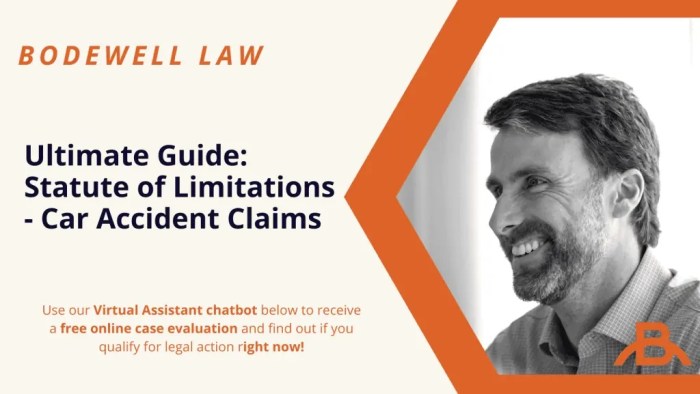Understanding the statute of limitations for car accident claims is crucial to ensure your rights are protected. This comprehensive guide will delve into the legal framework, time limits, exceptions, consequences, and practical considerations surrounding these claims, empowering you with the knowledge you need to navigate this complex legal landscape.
Understanding the statute of limitations for car accident claims is crucial to protect your legal rights. If you’ve been involved in a car accident, it’s essential to consult with an experienced attorney who can guide you through the legal process.
By knowing your rights, including those outlined in Car accident legal rights , you can ensure that you receive fair compensation for your injuries and damages.
Failure to file your claim within the specified time frame can result in losing your right to seek legal recourse, so it’s imperative to act promptly.
Statute of Limitations for Car Accident Claims
When you’re involved in a car accident, it’s important to know your rights. One of the most important things to be aware of is the statute of limitations. This is the deadline by which you must file a claim for damages. If you miss the deadline, you may lose your right to compensation.
Legal Framework
Purpose of Statutes of Limitations
Statutes of limitations serve several important purposes. First, they help to ensure that claims are filed in a timely manner. This prevents defendants from being unfairly prejudiced by having to defend claims that are based on stale evidence.
Second, statutes of limitations help to promote judicial efficiency by preventing courts from being overburdened with old claims.
It’s crucial to understand the statute of limitations for car accident claims to ensure you don’t miss out on your right to compensation. Hiring a car accident lawyer can help you navigate the legal process and maximize your chances of a favorable outcome.
They can provide invaluable guidance on the time limits for filing a claim and ensure that you meet all necessary deadlines.
Types of Statutes of Limitations

There are two main types of statutes of limitations that apply to car accident claims: the statute of repose and the statute of limitations.
- Statute of repose: This type of statute sets a deadline for filing a claim regardless of when the injury or damage occurred.
- Statute of limitations: This type of statute sets a deadline for filing a claim from the date of the injury or damage.
Time Limits
Statute of Limitations by Jurisdiction
The statute of limitations for car accident claims varies from state to state. The following table provides a summary of the statute of limitations in different jurisdictions:
| State | Statute of Limitations |
|---|---|
| Alabama | 2 years |
| Alaska | 2 years |
| Arizona | 2 years |
| Arkansas | 3 years |
| California | 2 years |
Calculating the Statute of Limitations
The statute of limitations for car accident claims begins to run on the date of the accident. However, there are some exceptions to this rule. For example, if the person who was injured is a minor, the statute of limitations may not begin to run until the minor reaches the age of majority.
Exceptions and Tolling: Statute Of Limitations For Car Accident Claims
Exceptions to the Statute of Limitations
There are a number of exceptions to the statute of limitations for car accident claims. These exceptions include:
- Fraud or concealment: If the defendant fraudulently concealed the injury or damage, the statute of limitations may not begin to run until the plaintiff discovers the fraud.
- Mental incapacity: If the plaintiff is mentally incapacitated, the statute of limitations may be tolled until the plaintiff regains capacity.
- Minority: If the plaintiff is a minor, the statute of limitations may not begin to run until the minor reaches the age of majority.
Tolling the Statute of Limitations
Tolling is a legal doctrine that can extend the statute of limitations. Tolling occurs when an event happens that prevents the plaintiff from filing a claim within the statute of limitations.
For example, if the defendant leaves the state, the statute of limitations may be tolled until the defendant returns.
Consequences of Missing the Deadline
Failure to File Within the Statute of Limitations

If you fail to file a car accident claim within the statute of limitations, you may lose your right to compensation. The court may dismiss your claim, and you will not be able to recover any damages.
Exceptions to the Dismissal Rule
There are a few exceptions to the rule that a claim will be dismissed if it is filed after the statute of limitations has expired. These exceptions include:
- Fraud or concealment: If the defendant fraudulently concealed the injury or damage, the court may allow the claim to be filed even if the statute of limitations has expired.
- Mental incapacity: If the plaintiff was mentally incapacitated when the statute of limitations expired, the court may allow the claim to be filed late.
- Minority: If the plaintiff was a minor when the statute of limitations expired, the court may allow the claim to be filed late.
Practical Considerations
Preserving Evidence
After a car accident, it is important to preserve all evidence that may be relevant to your claim. This includes:
- Medical records: Keep all records of your injuries and treatment.
- Property damage: Take photos of the damage to your vehicle and any other property.
- Witness statements: Get the names and contact information of any witnesses to the accident.
- Police report: Obtain a copy of the police report.
Protecting Your Rights, Statute of limitations for car accident claims
If you have been involved in a car accident, it is important to protect your rights. The best way to do this is to consult with an attorney. An attorney can help you to understand your rights and options, and can represent you in court if necessary.
End of Discussion
Time is of the essence when it comes to car accident claims. By understanding the statute of limitations and its implications, you can safeguard your legal rights, preserve evidence, and maximize your chances of obtaining fair compensation.
Remember, seeking legal counsel promptly is essential to ensure your interests are fully represented.
The statute of limitations for car accident claims varies by state, so it’s important to understand the time frame in your jurisdiction.
If you miss the deadline to file a lawsuit, you may lose your right to compensation. To ensure you don’t miss out, consider filing a car accident lawsuit as soon as possible after the accident.
This will give you the best chance of recovering the damages you deserve. Remember, the statute of limitations is strictly enforced, so don’t delay in seeking legal advice.
Key Questions Answered
What is the statute of limitations for car accident claims in my state?
The statute of limitations varies depending on the jurisdiction. Refer to our table in the article for specific time limits in different states.
What happens if I miss the statute of limitations?
Failing to file a claim within the statute of limitations typically results in the dismissal of your case. The court may not hear your claim, and you may lose your right to compensation.
Are there any exceptions to the statute of limitations?
Yes, certain exceptions may extend the statute of limitations, such as:
– Minors involved in the accident
– Individuals with mental disabilities
– Cases involving fraud or concealment




